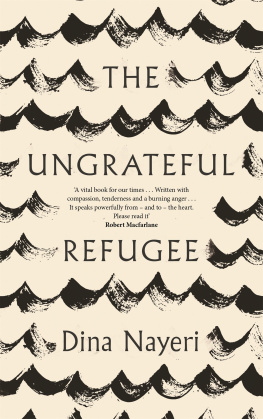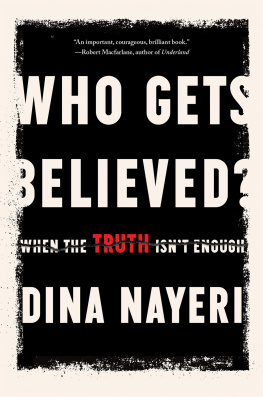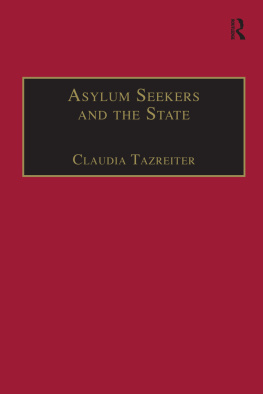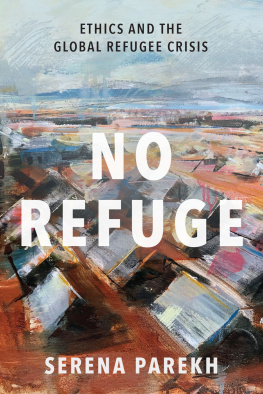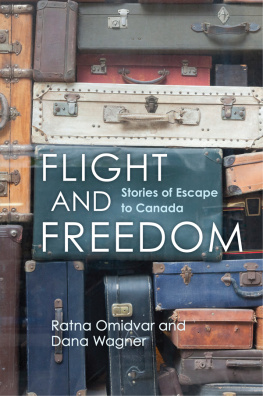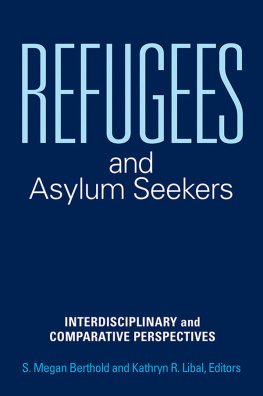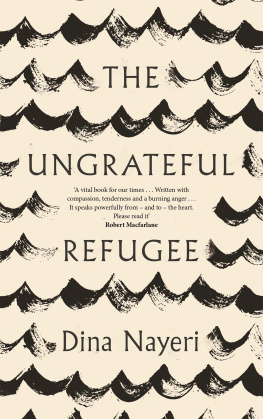Contents

First published in Great Britain in 2019
by Canongate Books Ltd, 14 High Street, Edinburgh EH1 1TE
canongate.co.uk
This digital edition first published in 2019 by Canongate Books
Copyright Dina Nayeri, 2019
Elegy for my Father by Mark Strand. Copyright 1979,
1980, 2007, Mark Strand, used by permission of The Wylie
Agency (UK) Limited and Alfred A. Knopf, an imprint of the
Knopf Doubleday Publishing Group, a division of Penguin
Random House LLC. All rights reserved.
The moral right of the author has been asserted
British Library Cataloguing-in-Publication Data
A catalogue record for this book is available on request from the British Library
ISBN 978 1 28689 345 1
Export ISBN : 978 1 78689 346 8
eBook ISBN : 978 1 78689 347 5
For Sam and Elena.
You make every country home.
Why did you lie to me?
I always thought I told the truth.
Why did you lie to me?
Because the truth lies like nothing else and I love the truth.
Mark Strand, Elegy for My Father
No Way. You will not make the Netherlands home.
Geert Wilders, message to refugees, 2015
To make someone wait: the constant prerogative of all power, age-old pastime of humanity.
Roland Barthes
Also by Dina Nayeri
Refuge
A Teaspoon of Earth and Sea
AUTHORS NOTE
I have tried to recreate events, locales and conversations from my memories and interviews with others. I have changed the names of some individuals and places, as well as altered identifying characteristics and details, such as physical properties, occupations and places of residence. In general, if I have not provided a last name in the text, the first name is changed to protect the individual. Examples are Darius, Taraa, Farzaneh, Majid, Valid, Minoo and all the children. My family, for obvious reasons, is an exception to this rule.
In recounting the escape stories of others, I have dramatised, putting as much as I could in-scene. I have only written about events that were carefully recounted to me. Afterward, I researched the times, places and context around each story, and brought the stories to life using sensory details that I found and imagined. Any mistakes are my own.
I have kept my language true to particular times and places. For example, though I use the word undocumented now, I didnt in the 1980s. Our word then was illegal. Even now, in the casual talk of refugees and lawyers, the word I hear is illegal. Sanitising language has its dangers. I tried not to do that, even with my own thoughts. For example, I dont use the word pussy now to describe weakness. But I did at sixteen.
Regarding the story of Kambiz Roustayi, the scenes before his arrival in Europe are imagined using what little he told his friends and supporters. Scenes from later in his life, after he had met the people I interviewed, are their accounts of his years in Holland.
The line of poetry from the parliament petition in March 2018 is quoted from a public reading. The poets name is withheld since she may not be documented.
In the portions of this book about my own life, my accounts are true according to my memory and perspective.
PART ONE
ESCAPE
(on good faith, credible risk and opportunism)
I.
W e became refugees. Somehow it felt more settled than what we had been for the past ten months, hiding out in the United Arab Emirates. There, we were illegal: all the same dizzying displacement, uncertainty and need, but we had to find our own shelter. Without a state to say, Yes, we will be responsible for you, we were so unmoored it was hard to fathom a next step. Maybe thats why every move had been last minute, someones kindness or a stroke of luck. Miracles. And so, when we landed in Rome in winter 1989, I bubbled with love for Italy and every Italian; it was unlike anything I had felt for Dubai or Sharjah. This airport was so European, so brimming with leisure; I wanted to run to every kiosk and smell the Western chocolate and touch the expensive fabrics. But a man in a black suit held a sign with Mamans name and we were led away to a car.
My mother, younger brother and I bundled in the back seat, cold and dirty from the long flight. I tried to stay awake for the ride through the Italian countryside. Finally, after an hour, we spotted a house on a hill, breaking up the rolling valleys in the distance. We had been told that wed be taken to a good refugee camp, a temporary safe space for transients seeking asylum outside Italy. It was called Barba and it had once been a hotel. The Italian government had leased this building to house the likes of us, political and religious asylum seekers and passers-through with particular need: elderly family, children. It was exciting to watch Barba appear and to know that, even though our clothes and bedding and daily routines would be those of refugees, though we would be confined there, our house would be on a hilltop, in the husk of a pretty hotel.
We pulled up a winding hill road after dinnertime. Our room was small, perhaps even smaller than the cockroach hostel in Sharjah, and we had no fridge or hot plate this time. Only a bathroom and a bed. We sat on our bed and wondered where wed get money, if wed find friends among our neighbours. Would we meet Farsi speakers? How long would we stay? Which country would finally take us? We wondered about that nights meal.
We considered walking to a store in Mentana. Then someone knocked. An Italian woman, young, with a punkish haircut gestured to us that we had missed the dinner call. That night, for the first time, I saw the canteen, a glass circle overlooking all that lush valley. Now empty and dark, in the morning it would fill up with displaced families like us, Iranians, Afghans, Russians, Romanians. It would buzz with many languages, many kinds of prayers. There would be children, mothers, grandmothers. But for now, the room was silent. We ate bowls of leftover pasta in semi-dark and heavy silence and thanked God that meals were provided here.
Despite its grand skeleton, Hotel Barba was a refugee camp and we had to stay put, as we had no status in Italy. We were served soup, pasta, coffee, bread at precise times each day and we sat in the winter chill, praying that by summer wed be gone from there. Every day when the postman arrived, we would swell outside the mail cubbies, jostling for a good view. We wanted to know, Who got his letter today? When someone did, the crowd would hush as he opened the envelope, fingers trembling, eyes scanning, then either wept quietly into his palm, muttering curses, or loudly on his knees, thanking his god. Everyone was frantic for a letter from America or England or Australia or Canada (roomy anglophone countries). A letter would mean the wait was over; our lives could now begin.
In the absence of work or school, all we did was dream, a maddening state, and battle loneliness. We ate with people from our own countries; we prayed in our own ways, some before eating (sitting, heads bowed) and some after (standing, holding hands). On cool days, the children snuck into a neighbouring orchard to steal unripe peaches and plums, because our tongues were itching for something sour and there was nothing else to soothe the craving. I tried to teach some English words to a handful of burly Russian men, skipping around the yard in my pink skirt and pointing to a tree, a fence, a chador, a babushka (the men indulged me by taking notes).
Next page
